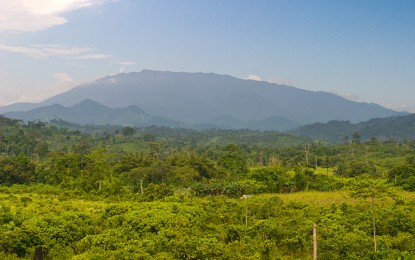
ANCESTRAL DOMAIN. Mt. Mantalingahan Ransang, which is part of an ancestral domain but is not being co-managed by the tribal dwellers, says Indigenous Peoples Mandatory Representative Joel Lumis. (File photo courtesy of Alastair Robinson, July 2007).
PUERTO PRINCESA CITY, Palawan -- The indigenous peoples mandatory representative (IPMR) of Palawan is urging the provincial board to pass his proposed ordinance, which seeks the co-management by tribal communities of tourists destinations within their ancestral domains.
IPMR and Ex-Officio Board Member Joel Lumis on Friday told the Philippine News Agency (PNA) there are tourist sites in the province within their ancestral lands but are not being co-managed by the IP dwellers.
These are the Calauit Safari Park in Busuanga town, the Puerto Princesa Underground River, Mt. Mantalingahan Protected Landscape that is straddled in the territorial jurisdiction by five municipalities in southern Palawan, Victoria’s Peak and Estrella Falls in Narra, and Tabon Caves in Quezon.
“Nakapaloob ang mga lugar na ito sa loob ng ancestral domain na may applications na for certificate of ancestral domain titles. Meron tayong tinatawag na native title, ibig sabihin lahat yan dapat masama sa management nila ng mga katutubo (These sites are within ancestral domains that have applications for certificate of ancestral domain titles. We have what we call native titles, which means they should all include the IPs in the management of these sites),” said Lumis.
In cases where proclamations had been passed to make them special sites prior to the passage of the Indigenous Peoples Rights Act (IPRA), he hopes these can be reviewed or amended to include the IPs as co-managers of tourist sites in their own lands.
He said there are places in the ancestral domains considered “sacred” by the IPs; if they are not made co-managers, there is a possibility that tourists will unintentionally trespass.
“Bawat area may mga sagradong lugar ‘yan. Ngayon kapag hindi natin kasama ang mga IPs dyan mag-manage, tapos biglang pumunta sa sagradong lugar ang mga bisita, maba-violate ang rights ng IP (Each area has sacred places. Now, if we do not make the IPs as part of the management, their rights will be violated if visitors enter these sacred places),” he added.
On Tuesday, Lumis filed during the provincial board’s regular session his proposed Ordinance No. 19-18, which calls for co-management by IPs of tourist spots. This, he said, is pursuant to Section 17, Article 14 of the 1987 Philippine Constitution, and the United Nations Declaration on the Rights of Indigenous Peoples on recognition, protection, and promotion of their rights.
“Ancestral domains in Palawan are sacred, it is only right for the indigenous dwellers to co-manage them and protect and preserved their integrity,” he said.
Under the proposed measure, any decision by the Department of Tourism, the provincial government, municipal government, or any other agencies, on tourism sites in ancestral domains will not be valid without the intervention or consent of the IPs.
“Ang gusto lang naman namin ay respeto sa karapatan namin. Kunting pang-unawa lang dahil marami sa amin ang di nakikinabang sa regalo na bigay sa amin bilang mga katutubong naninirahan sa mga ancestral domains (What we want is a little respect for our rights. A little understanding will go a long way since many of us need to benefit from the gifts of our ancestral domains as native dwellers),” he said.
His proposed ordinance is now being studied by the provincial board's committee on rules and laws. (PNA)
